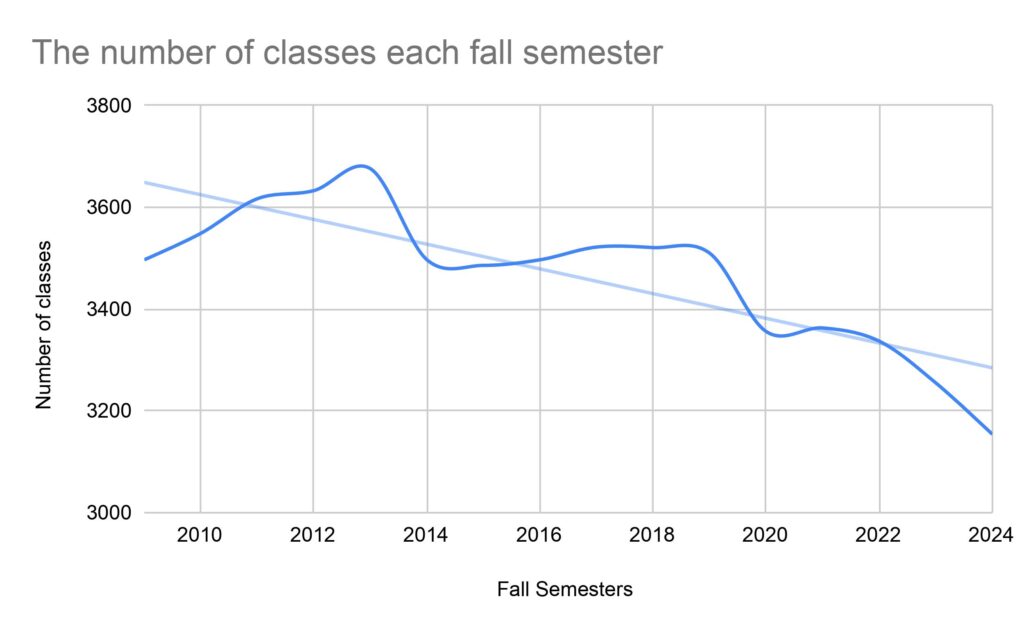SARA LODESPOTO
Special to The Leader

Graphic by Sara Lodespoto | Special to The Leader.
As you look around your classroom in Thompson Hall, the chairs are filled with students from wall to wall. When you made your schedule, you didn’t want to take this class, especially at 8:30 a.m.
You were left with no choice since every section was full by the time you registered and, not to mention, the classes you wanted to take were gone.
This situation of dwindling classes has been an increasing problem, with students having fewer classes to choose from. In the fall of 2013, there were approximately 3,600 classes available across every major. This upcoming fall semester only holds 3,100 classes.
In the graph included with this article, the trendline shows the decrease in classes in the past 15 years. The number of classes has been decreasing for years, but has dramatically dropped since the COVID-19 pandemic.
What is the cause of this? Daniel Smith, a senior academic advisor, believes it is due to a lack of funding and faculty. Since there are fewer students, Fredonia is trying to save money.
Not only has Smith noticed that the number of sections of classes lowered, but that the actual classes offered have lowered as well. “When you used to search [the history foundations], you would [usually] see 15, 20 different options for courses and now, it’s like one or two.” This applies to all departments, not just history.
Smith’s job helps students create their schedule, which has become more challenging with fewer classes. Students struggling the greatest with creating their schedules, according to Smith, are the students that sign up late or are underclassmen, since most of the class’s chairs have been filled by the time they register.
“With [fewer] offerings, it [gives] the flexibility for students to select classes not even based on their times, but based on their needs.” he said.
Kelly Ibach, a senior double majoring in psychology and video production who is graduating in May, had difficulties with her major due to the limited space available for her classes. When she was a sophomore during the quarantine guidelines, she was originally only a psychology major with all her Fredonia Foundations courses finished.
However, when looking for classes for the next semester, she realized that, because the classes were filled up, she would not be able to get into any of her required psychology classes. “I just couldn’t get into the classes I need for my major, so I [thought that I] might as well just add another major and have it be a productive semester,” Ibach said. She added a major in communication: video production to ensure she didn’t waste a semester.
Another senior, majoring in video production, Brian Austin, shared his experience trying to get into a special topics class.
“Writing for RPGs” is a course only provided every other spring semester, which Austin really wanted to get to take because he is a creative writing and English minor. However, when finding out that the class space was filled up, he emailed the professor for an override. After a couple of weeks, he acknowledged how lucky he was for his override to be a success.
Many academic departments have been increasingly stricter on the overrides. According to Smith, professors aren’t allowed to exceed the capacity of the class because classroom experience would shift and professors would have more constraints on their capabilities to teach the students.“Now you have less offerings and less flexibility from professors. There’s just no choice for students to take a course,” Smith said.
Not only are students struggling, but faculty are, as well. Even though there are fewer classes, faculty members are still expected to keep up with the workload.
Smith points out how professors have always been overworked, but it has increased since COVID-19. Professors have been asked to teach more courses, instead of hiring more faculty.
Tenured professors are more affected by this because the more courses they teach, the less time they have to aid struggling students in class or internships and their own scholarship work.
“It seems like a small impact … but the scholarship that they do and the research they do is really, really valuable to both the university and to the student experience,” Smith said.
Out of 16 professors who have more than 10 years of working experience at SUNY Fredonia, more than 70 percent have noticed an increase in workload. A professor in the English department explained that this is “because the number of faculty lines has shrunk dramatically across departments.”
Many students, professors and faculty are affected by changes made to schedules.
So, how can students get into the classes they need?
Smith suggests being flexible with your schedule and understanding that you might not get the times, professors or even foundation classes that you want.
If the course is filled up now, have patience, and remember you can take it the following semesters.
Kelly Ibach, who was interviewed for this article, is currently PR & Event Chair for The Leader.
